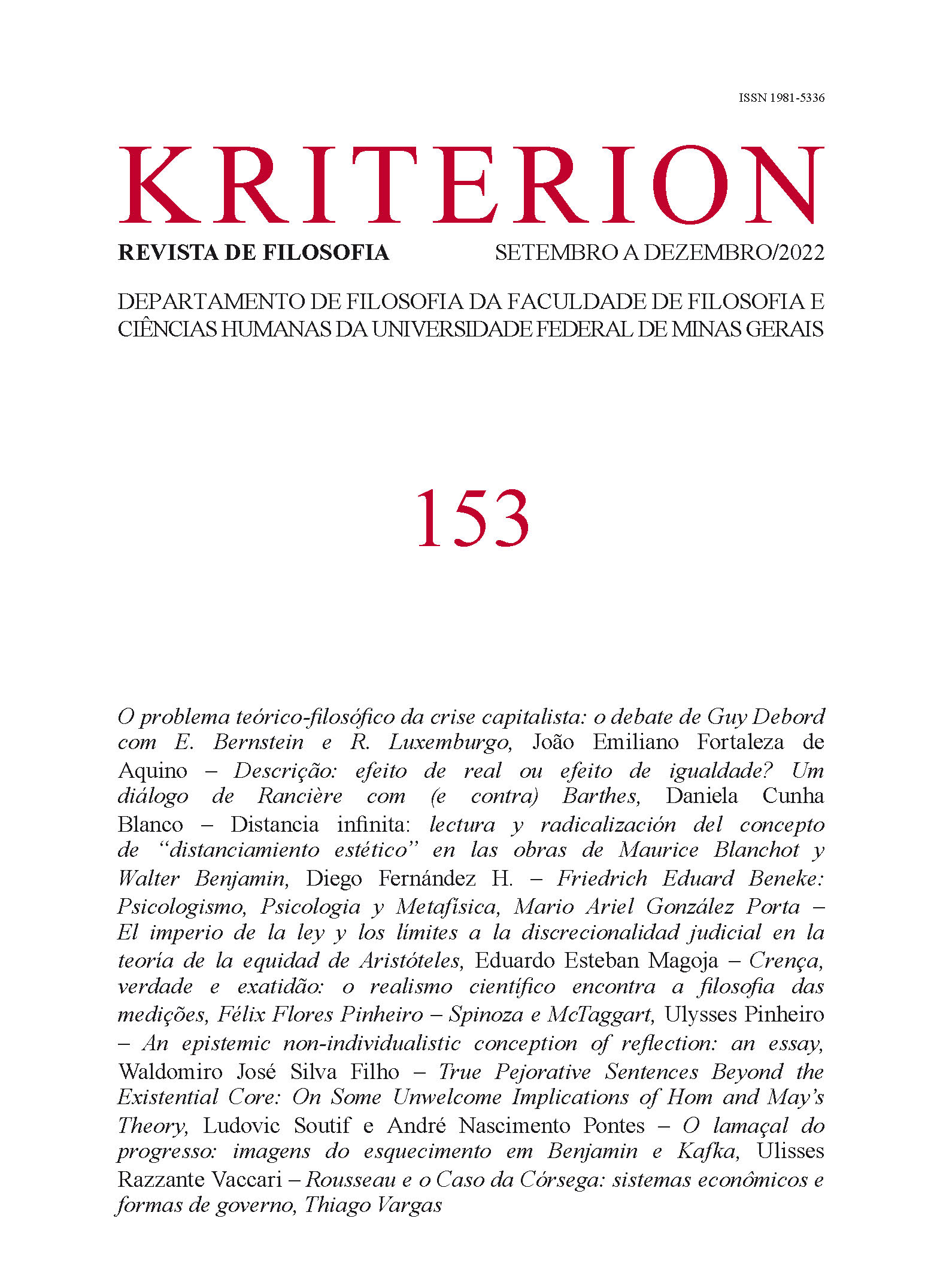DESCRIPTION: AN EFFECT OF REALITY OR AN EFFECT OF EQUALITY?
A RANCIÈRE DIALOGUE WITH (AND AGAINST) BARTHES
Keywords:
Jacques Rancière, literature romanesque, representation, aesthetic regime, politics of writing, Roland BarthesAbstract
In “The Lost Thread: the democracy of Modern Fiction”, Jacques Rancière will criticize Roland Barthes, stating that his interpretation of Gustave Flaubert's book “A simple heart” would have shown himself unable to understand the politics of writing of romanesque literature. For Thomas Clerc, reader of Barthes, Rancière would have been confused by the double character of Barthesian thought: both structuralist and critical. Both authors, Barthes and Rancière, strive to refuse a thought based on the notion of representation. Our hypothesis, however, is that the authors diverge in relation to the very meaning of representation, resulting in a divergence in the understanding of politics, which would support Rancière's criticism of Barthes not as a confusion, but, rather, as a refusal to the politics of Barthesian writing. With this, we intend to reconstruct the arguments of both autors around Flaubert, to understand the politics of writing that they operate. Refusing the point of view structuralist and demystifying of ideologies of Barthes, Rancière points to another reading that sees in the Romanesque literature the rupture in relation to the politics of writing of the representative regime and the configuration of the aesthetic regime.
Downloads
References
BARBEY D’AUREVILLY, J. “M. Gustave Flaubert”. In: Les oeuvres et les hommes : IV. Les romanciers. Paris: Amyot, 1865 [Online]. Disponível em: https://obvil.sorbonneuniversite.fr/corpus/critique/barbey-aurevilly_romanciers#body-7-1 (Acessado em 8
de março de 2022).
BARTHES, R. “A câmara clara: nota sobre a fotografia”. Trad. Júlio Castañon Guimarães. 7ª ed. Rio de Janeiro: Nova Fronteira, 2018.
______. “Introdução à análise estrutural das narrativas”. In: A aventura semiológica. Trad. M. Laranjeira. São Paulo: Martins Fontes, 2001.
______. “O efeito de real”. In: O rumor da língua. Trad. M. Laranjeira. São Paulo: WMF Martins Fontes, 2012a.
______. “O grau zero da escrita”. Trad. M. M. Barahona. Lisboa: Edições 70, 2015.
______. “Por que gosto de Benveniste”. In: O rumor da língua. Trad. M. Laranjeira. São Paulo: WMF Martins Fontes, 2012b.
BENVENISTE, É. “Problemas de linguística geral I”. Trad. M. G. Novak e M. L. Neri. 5ª ed. Campinas: Pontes Editores, 2005.
BRETON, A. “Manifesto surrealista”. 1924 [Online]. Disponível em: http://www.ufscar.br/~cec/arquivos/referencias/Manifesto%20do%20Surrealismo%20%20Andr%20Breton.htm (Acessado em 8 de março de 2021).
CALDERÓN, A S. “Los bordes de la representación”. Theory now: journal of literature, critique and thought, Vol. 3, Nr. 1, jan.-jun. 2020, pp. 30-49.
CLERC, T. “Barthes apreendido por Rancière”. Criação & crítica, São Paulo, Nr. 14, 2015, pp. 91-104.
FLAUBERT, G. “Lettre de Flaubert à Louise Colet (1846)”. Correspondência eletrônica de Flaubert. Ed. Yvan Leclerc e Danielle Girard, 2017 [Online]. Disponível em: https://flaubert.univ-rouen.fr/jet/public/correspondance/trans.php?corpus=correspondance&id=9900&mot=&action=M (Acessado em 12 de maio de 2021).
______. “Madame Bovary”. Trad. M. Laranjeira. São Paulo: Penguin Classics Companhia das Letras, 2011.
______. “Um coração simples”. Trad. C. M. Vaz, D. Vaz, S. K. Rickmann. Rio de Janeiro: Paz e Terra, 1996.
FRANÇA. Le Ministère Public. “Procès de Madame Bovary. Réquisitoire de M. L’Avocat Impérial, Ernest Pinard”. Gustave Flaubert. 1857 [Online]. Disponível em: http://flaubert.univ-rouen.fr/oeuvres/mb_pinard.php (Acessado em 12 de maio de 2021).
KNACK, C. “A linguagem (re)descoberta: contornos prospectivos da leitura barthesiana de Benveniste”. Revista Linguagem e Ensino, Pelotas, Vol. 23, Nr. 3, Jul.-Set. 2020, pp. 702-719.
MOTTA, L. T.; FONTANARI, R. “Escrever ‘no grau zero’ com a luz. Sobre a semiologia barthesiana da fotografia”. Crítica cultural, Palhoça, SC, Vol. 12, Nr. 1, Jan.-jul. 2017, pp. 87-94.
MOTTA, L. T.; FONTANARI, R. “Roland Barthes in Camera Lucida, the unfaithful semiologist”. Matrizes, Vol. 6, Nr. 1 e 2, jul.-dez. 2012, pp. 161-168.
PERRONE-MOISÉS, L. “Prefácio”. In: BARTHES, R. O rumor da língua. Trad. M. Laranjeira. 3ª ed. São Paulo: WMF Martins Fontes, 2012.
PLATÃO. “A república”. Trad. J. Guinsburg. 1ª reimp. São Paulo: Perspectiva, 2010.
PONTMARTIN, A. “Le roman bourgeois et le roman démocrate”. In: Le correspondant, pp. 289-306, 25 de junho de 1857 [Online]. Disponível em: https://flaubert.univ-rouen.fr/etudes/madame_bovary/mb_pon.php (Acessado em 9 de março de 2021).
RANCIÈRE, J. “A revolução estética e seus resultados”. In: Projeto Revoluções. São Paulo, 2011 [Online]. Disponível em: http://www.revolucoes.org.br (Acessado em 15 de maio de 2021).
______. “Le partage du sensible: esthétique et politique”. Paris: La Fabrique-éditions, 2000. Trad. port. M. C. Netto. São Paulo: Ed. 34, 2009.
______. “Les bords de la fiction”. Paris: Éditions du Seuil, 2017a. Trad. port. F. Scheibe. São Paulo: Editora 34, 2021.
______. “Aux bords du politique”. Paris: La Fabrique-éditions, 1998. Trad. J. P. Cachopo. Lisboa: KKYM, 2014.
______. “O efeito de realidade e a política da ficção”. Novos Estudos – CEBRAP, Nr. 86, 2010a, pp. 75-90.
______. “O fio perdido: ensaios sobre a ficção moderna”. Trad. M. Mori. São Paulo: Martins Fontes, 2017b.
______. “O mestre ignorante: cinco lições sobre a emancipação intelectual”. Trad. L. Vale. 3ª ed. Belo Horizonte: Autêntica, 2010b.
______. “Políticas da escrita”. Trad. R. Ramalhete, L. E. Vilanova, L. Vassalo e E. A. Ribeiro. 2ª ed. São Paulo: Editora 34, 2017c.
______. “Sobre políticas estéticas”. Trad. M. Arranz. Barcelona: Servei de Publicacions de la Universitat Autònoma de Barcelona, 2005.
SAUSSURE, F. “Curso de linguística geral”. Trad. A. Chelini, J. P. Paes, I. Blikstein. 34ª ed. São Paulo: Cultrix, 2012.
VOIGT, A. F., MARTINS, M. M. “Arte, imagem e fotografia: um diálogo possível entre Roland Barthes, Walter Benjamin e Jacques Rancière”. Oficina do historiador, Porto Alegre, Vol. 9, Nr. 1, jan.-jul. 2016, pp. 250-264.
Downloads
Published
How to Cite
Issue
Section
License
Copyright (c) 2022 Revista Kriterion

This work is licensed under a Creative Commons Attribution 4.0 International License.










